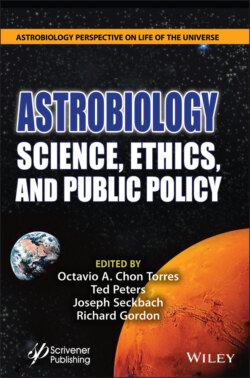Читать книгу Astrobiology - Группа авторов - Страница 42
2.4 Levels of Intelligence in the Milky Way Metropolis
ОглавлениеIs it likely that yet-to-become neighbors are already living in our Milky Way metropolis? Yes, indeed. “A conservative estimate,” speculates University of Arizona astrobiologist Chris Impey, “might be a billion habitable ‘spots’— terrestrial planets in conventionally defined habitable zones, plus moons of giant planet harboring liquid water—in the Milky Way alone. That number must be multiplied by 1011 for the number of ‘petri dishes’ in the observable cosmos” [2.34].
When we meet them, will they be like us? No, says philosopher of biology Michael Ruse. Something like us, perhaps; but not us. “It seems that natural selection can and does produce intelligent beings all the way up to humans. I confess that even if this can happen, I would think selection would more likely produce humanoids—beings like humans but not necessarily identical to us. There might be at least as many Wookies in the universe as there are humans” [2.75].
The first question the ratiocentric astrobiologist will ask about our extraterrestrial contacts will be this: Are they intelligent? If so, just how intelligent? We mean it when we employ a term such as ETI, extraterrestrial intelligence.
In anticipation of contact with alien intelligence in a form that reasonably resembles Homo sapiens on Earth, perhaps we should consider engagement with three possibilities: extraterrestrial biotic individuals who are inferior to us (intellectually less intelligent), our peers (equal in intelligence), and superior to us (more highly intelligent) [2.58]. Each of these three categories implies a different set of moral responsibilities [2.58].
Curiously, for decades prior to the advent of the field of astrobiology, astronomers and science fiction writers measured the variety of extraterrestrial beings according to scales of intelligence. The mere existence of astrocognitionists among astrobiologists demonstrates the preoccupation we have with intelligence. “The multidisciplinary field of astrocognition,” according to David Dunér, “could be generally defined as “the study of the origin, evolution and distribution of cognition in the Universe,” or simply “the study of the thinking Universe” [2.28]. Until recently, coffee conversation among astrobiologists distinguished between stupid microbial life, on the one hand, and intelligent or even super-intelligent aliens, on the other. Elsewhere I have argued that all life is intelligent, even microbial life; and what we are dealing with are relative levels of intelligence [2.61].7
Regardless of my position on continuity of intelligence, the astroethicist must speculate about possible and probable ETI scenarios. We may make new galactic friends with beings inferior to us in intelligence, equal to us in intelligence, and even superior to us in intelligence. Some might be hostile. Some might be friendly. Others might even be benevolent. Each possible extraterrestrial scenario would shape our terrestrial response and our responsibility. In what follows we will get specific about each scenario.
